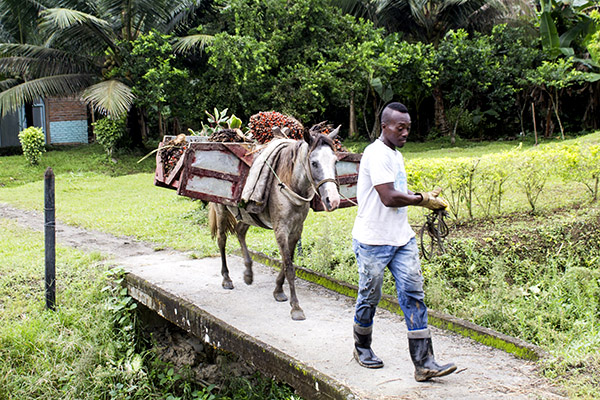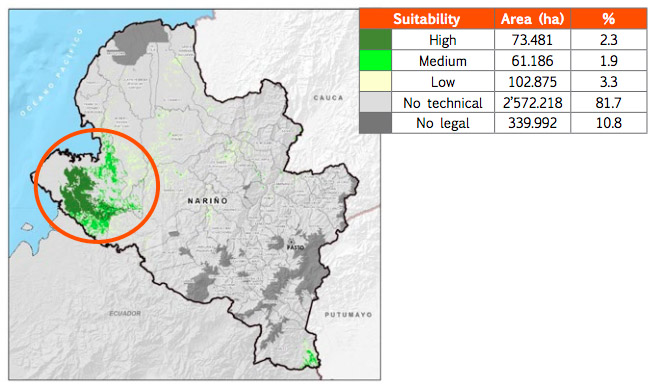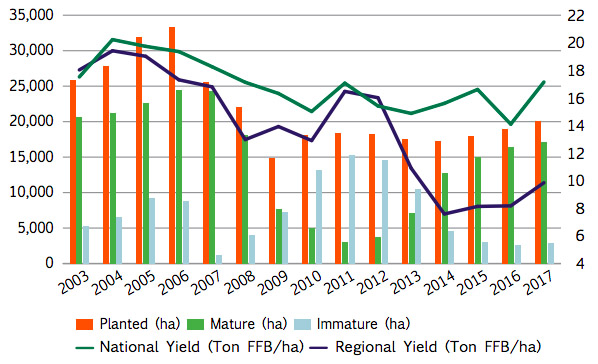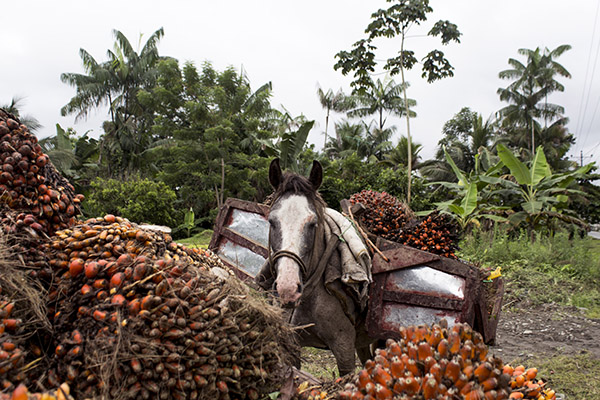This story is taken from a paper written by David Calderón and Carlos Alberto Pérez, submitted for inclusion in ETFRN News 59 which explores inclusive oil palm production.

Oil palm in Tumaco
Tumaco municipality on the Pacific coast of south west of Colombia, bordering Ecuador, has a seaport and good conditions for agricultural production, but weak state presence over its 5% indigenous and 89% Afro-descendant population of some 210,000 people.
Tumaco town suffers high rates of poverty, and low access to basic services, with 53% of rural housing not connected to basic water and sewage infrastructure (CAF 2018). Due to its coastal location and the presence of lush mangroves and rainforests, in past decades it became a hotspot for coca production and processing as well as a hub for cocaine trafficking. This has created a vicious cycle of violence that is proving difficult to end, with armed groups controlling much of the area despite huge efforts by the Colombian army to eradicate illicit coca production and trade.
Before the drug trade boomed in the 1990s, Tumaco was a flourishing area for the production of palm oil and had the highest yields per hectare in the country. Cultivation of oil palm began in the 1960s, and from the 1980s the involvement of more companies led to the expansion of oil palm to more than 33,300 ha of plantations by 2006; 45% owned by smallholders, with eight mills, and an industry that then employed (directly and indirectly) some 30,000 people.
Tumaco has more than 70,000 ha of land that is considered suitable for oil palm cultivation (UPRA, 2018). Nevertheless, to take advantage of this, local civil society organizations like Cordeagropaz have identified the need to provide technical support to smallholders. During 2000-2006, it promoted the development of associative projects that resulted in the planting of 2,700 ha with oil palm, benefiting 450 families.

Suitable areas to develop oil palm crops in Nariño Department Source: UPRA 2018)
Responding to challenges
But then disaster struck in 2006, with the arrival of bud rot disease (Phytophthora palmivora), and that spread rapidly in Tumaco over the following years. The number of infected oil palm trees increased from 441,000 in January 2007 to 3 million in February 2008, or from 8% to 58% of the total number of oil palms planted. Almost the entire crop was destroyed, with smallholders significantly affected, and more than 10,000 jobs disappeared. This created an urgent need to start a coordinated intervention to ensure crop renewal and the eradication of infected palms (Corredor, Martínez López and Silva Carreño 2008).
In 2007, the Colombian government, through the Ministry of Agriculture, initiated a support programme for the oil palm sector in Tumaco municipality. Smallholders with less than 50 ha who were unable to access commercial credits received subsidies on the eradication costs, installation of new crops and the requirements associated with the cultivation of hybrids.
To be granted these benefits, growers needed to apply a set of practices of eradication approved by the Colombian Agricultural Institute (ICA) and the Colombian Oil Palm Research Center (Cenipalma). On top of this, additional support was provided to smallholders who were unable to pay back loans to fund the eradication of old and infected plantation. And included as part of the subsidies, the Colombian Federation of Oil Palm Growers (Fedepalma) and Cordeagropaz also provided technical advice to accompany their investments to renew affected areas with new and disease-resistant OxG hybrids.

Figure 1. Area under oil palm and annual yields in the South-western zone of Colombia (2003-2017)
As a result of these efforts to replace infected oil palm plantations and expand production, Tumaco was able to increase its area of mature palms from less than 4,000 ha in 2012 to more than 16,000 in 2017. But despite this impressive comeback, the total area was still only half the area that was under oil palm in 2006, and average yields per hectare had declined to 50% below the national average (Figure 1).
In order to restore the full potential of palm oil for the 400 smallholder producers that were receiving technical support from the Cordeagropaz in Tumaco until last year, which can be useful to restore more than 2,000 small and medium-sized palm growers that Tumaco had back in 2006 (according to figures provided by Birmarck Preciado, director of Cordeagropaz); national and local authorities have made it a top priority to support the palm oil sector as a driver for regional economic growth and employment. A parallel aim was also to develop palm oil production into a solid alternative for growing coca for processing into cocaine and the associated drug trafficking that results.
The renewal of oil palm plantations has not been easy. Progress has been made towards adopting best practices, but small growers face financial challenges and require technical and social support to improve their farm management and to adopt the culture of legality.
According to Bismarck Preciado, leader of Cordeagroapaz, "The renewal of oil palm plantations has not been easy. Progress has been made towards adopting best practices, but small growers face financial challenges and require technical and social support to improve their farm management and to adopt the culture of legality,” meaning not growing coca. He considered this support as especially important during the first four years of the oil palm production cycle before the crop starts bearing fruit. He also pinpoints the need for social projects that help to integrate farmers and their families into the 25-year oil palm production planning cycle.
Within this context, the 2016 peace agreement between the Colombian government and the FARC (Revolutionary Armed Forces of Colombia) was a very important moment in Tumaco. The FARC was one of the most involved actors linked to coca cultivation, drug trafficking, extortion and kidnapping in this region. But despite the peace agreement, new guerrilla units vie with criminal gangs for control of drug trafficking routes in the Tumaco area left by the FARC after its demobilization. In addition, some FARC dissidents also set up splinter factions, and that are already ‘taxing’ local traffickers and extorting grocery stores and other small businesses.
Investing in the consolidation of a legal and economically viable economy such as that offered by palm oil production and processing, is considered as one of the few options that has the potential to instill a lasting and more inclusive peace in the area. But to ensure this, support to smallholders must respond to key issues such as the need to implement good agricultural practices, including adequate sanitary control to reduce the risk of pest and disease outbreaks, and improving productivity per hectare. In addition, because the region is a conflict zone, it is particularly important to pay due care and attention to social aspects. This requires ensuring proper and accessible processes for land entitlement, especially for victims of the conflict, the
promotion of adequate and formalized labour conditions for workers, and supporting gender equity across the supply chain.

Transport of oil palm fruit in Tumaco, Nariño
A bridge too far?
Only 14% of the 1.7 million tonnes of palm oil produced each year in Colombia was RSPO certified in 2017. But Fedeplama has set a goal to certify up to 50% of national production by 2020, and to achieve 75% RSPO certified production by 2025. But interviews with Tumaco smallholders indicated that many consider RSPO criteria as a ‘bridge too far’. Since major global industry players have vowed to purchase only RSPO certified crude palm oil by 2020, smallholders in Tumaco are faced with yet another hurdle to keep their businesses afloat.
But with the help of Solidaridad, Cenipalma and Cordeagropaz, the palm oil sector in Tumaco has identified the challenges for adopting more sustainable practices in line with the RSPO standard. This partnership consisted of two phases. The first was funded by the Dutch Ministry of Foreign Affairs. This included training and exchange visits to raise awareness on what are the RSPO criteria and to build the capacity among 390 smallholder families to meet them. During the second phase, activities involved farmer field schools and training to adopt RSPO practices. Nine demonstration farms were established, and technicians and leader farmers implementing the standard were trained. Smallholders learnt how to improve agricultural practices, detect and prevent diseases, for example, through fumigation, and better management of water and waste. Consequently, they started to realize that the RSPO standard they were so afraid of and thought to be unattainable, become a useful tool that is now helping them to improve their performance.
The Farming Solution app
Monitoring and support are crucial for increased smallholder inclusiveness, and one way to achieve this is through technical innovation. An example of how this can benefit smallholders was the development of new mobile phone apps. From 2017, the RSPO Smallholders Support Fund (RSSF) has supported the group’s efforts in their journey towards RSPO certification.
Solidaridad has since leveraged funds by engaging the German multinational Henkel, a company that is strongly committed to sustainable supply chains. They will support Solidaridad and partner Cenipalma to develop, test and scale up digital tools between 2018- 2021, to assess the palm oil producer performance against RSPO criteria using a continuous improvement model.
In April 2018, Solidaridad started the development of Farming Solution mobile app. This digital self-assessment tool identifies the sustainability level of a farm according to the answers given by the producer. The questionnaire contains about 180 questions that were developed in line with the RSPO Principles and Criteria for Colombia. After all the questions are answered it automatically produces work plans with costs to answer to identified gaps. It also establishes the level of risk involved in different farmer decisions. For illiterate farmers, the mobile app has an audio button that reads everything.
Another app that is under development is Extension Solution. It allows technicians from the mills or farmer associations to verify the answers given by farmers in Farming Solution and follow their improvement. The consolidated data collected from farmers is also valuable for mills, processors, traders, buyers and the national federation. This helps to set realistic goals and keep track of performance, and make decisions on farmer needs to develop and implement improvement plans to assist producers on their journey to RSPO certified production.
The project aims to reach all smallholders in the Tumaco area by 2020.
https://youtu.be/ye_S3j9MMIk align:center
Lessons and recommendations
Partners in Tumaco concluded that it is more likely that producers adopt good practices and grow their business by seeking incremental improvements over time, through tailor-made support in each stage of the learning curve.
Solidaridad’s digital tools are being developed with and for palm oil sector stakeholders to support companies and producers with mapping and implementation of RSPO criteria.
The story of the evolution of the palm oil sector in Tumaco has shown that profound crises can be overcome through coordinated long-term actions by private and public partners. The palm oil industry used to be the leading agroindustry in the southwestern corner of the country, offering formal labour contracts, health coverage, social security and trainings to professionals and workers. After suffering major crop losses following the outbreak of crop a pest infestation, it has since rebounded. Oil palm offers a constant cash income resulting from regular harvests and a steady demand, allowing thousands of smallholders to invest their income in improving their farms, better environmental conditions and education for their families.
Yet much still has to be done to consolidate a truly inclusive palm oil sector over the long term in Colombia, and how the new mobile applications can contribute. Key complementary topics that also require further work in the coming years include the administration of effective land entitlements. and better conditions for workers. Only significant advances in these and other areas will allow the oil palm sector to fulfill its true potential as a viable alternative to the production of illicit crops and thus support the peace process in Colombia.
